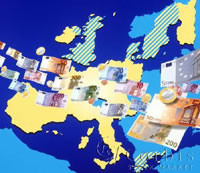The eurozone economy got off to a sluggish start to this year, EU data released Wednesday showed, providing further evidence that a long-awaited recovery is running out of steam.
The eurozone economy grew 0.5 percent in the first three months of the year from the previous quarter, bringing the increase over one year to 1.3 percent, data from the European Union's statistics agency Eurostat showed.
The first quarter figure, which was unchanged from an initial estimate, met analysts' forecasts and marked a pickup from a 0.2-percent growth rate booked in the previous quarter.
In the broader 25-nation EU, growth is faring only marginally better with the economy also growing 0.5 percent in the first quarter on a quarterly basis but 1.6 percent on a yearly basis.
IXIS CIB economist Luca Silipo said the 0.5 percent figure for the eurozone "hides asymmetric developments" in the bigger economies in the 12-nation area, pointing to "strong growth in the first quarter in Germany and Spain, slightly disappointing in France and plunging in Italy".
Looking ahead, the EU's executive commission predicted the eurozone economy was likely to remain fragile.
It estimated the economy would grow in a range from 0.1 percent to 0.5 percent in the second quarter from the previous quarter trimming back its forecast by 0.1 percentage point.
In the third quarter, the eurozone economy would grow 0.2-0.6 percent, the commission forecast.
Although the data came as no surprise, they provided further evidence that the eagerly awaited recovery in growth is proving much weaker than expected.
Only two months ago, the European Commission forecast that the eurozone economy would grow 1.6 percent this year, which was already a downward revision from an earlier 2.0 percent estimate.
But most economists have lower forecasts and the commission will probably have to cut back its estimate as well.
The European Central Bank (ECB) has cut its forecast for eurozone 2005 growth to 1.4 percent from 1.6 percent previously, central bank sources said ahead of the release of ECB estimates on Thursday.
But other economists are expecting even weaker growth.
In a spring cleaning of its economic forecasts last month, the Organisation for Economic Cooperation and Development trimmed back its 2005 growth estimate for the eurozone to only 1.2 percent.
The growth figures come amid growing evidence of weak activity in the eurozone industrial sector.
Data published Wednesday showed the eurozone purchasing managers' index fell to 48.7 points in May from 49.2 in April, marking its third consecutive decline and the second month with a reading below the 50 dividing line between growth and contraction in manufacturing activity.
Commerzbank analyst Christoph Weil said the figures suggest that output is now declining and confirm the gloomy picture already painted by business confidence surveys.
"Other leading indicators such as the EU commission's business confidence index and the national business climate indices for France and Germany likewise reveal a serious setback in industry since the beginning of the year," he said.




 By: N. Peter Kramer
By: N. Peter Kramer
